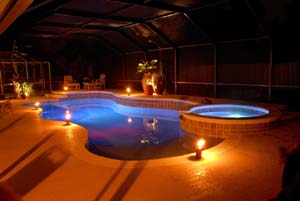Knowing a little about swimming pool repair can save the pool owner some cash. Common causes of water leaks from the pool include shell leaks, plumbing leaks, and excessive water splash or evaporation.
Because water evaporation can occur, the best way to rule this out is to take a large pitcher filled with water and sit it on the top step of the pool. Once the water has calmed, remove water from the pitcher until the water levels in the pool and in the pitcher are even. Let the container remain for about two days and then check and see how much water has evaporated from the pitcher. If the amount of water evaporated from the container still matches or almost matches the water level in the pool, then the water loss from the pool is most likely due to evaporation. If this is the case, no swimming pool repair is needed.
If the water level in the swimming pool is significantly lower than the water level in the pitcher, then the pool most likely has a water leak. When a leak is suspected the first place to check is around the filter and pump system of the pool. This is the most common type of swimming pool repair. Look for damp spots around this area and trace them back to the water source. More often than not, leaks around the pump and filter will be at a connection point on the pipes. In order to know which part of the plumbing must be replaced, the pool owner should make note of whether the water loss occurs greatest when the pump is running or when the pump is turned off. If the greatest loss occurs when the pump is running, the leak is on the pressure side past the impeller. If the greatest water loss occurs when the filter is not running, the leak is on the vacuum side before the impeller. To fix this leak, the swimming pool plumbing must be replaced. If the pool owner is not comfortable with doing this, a professional should be contacted. In most cases, it is advisable to contact a professional, especially for leaks on the backwash line which require extensive digging.
The next area to examine if no leak is found in the pool plumbing would is the shell. The best way to find these types of leaks is by placing a small amount of food coloring around any area that looks suspicious or pierces the pool shell. Almost always it is advisable to leave these repairs to professionals, but for the do-it-yourself type, pool shell repair supplies are sold at most local hardware stores. The most common is a simple shell repair patch kit.
Swimming pool repair can seem a daunting task but knowing the causes of common leaks and how to find them can help pool owners save some money and time. Pool owners should check pools any time water loss is noticed, and especially when getting the pool ready for summer swimming. Effective swimming pool repair will ensure the lifespan of the swimming pool and cool, refreshing entertainment for the family.
Woah! Im really enjoying the http://edpillolait.com of this blog Cialis preise in Deutschland http://www.metalobil.fr/ed/de.html Cialis Generika 20mg kaufen in Deutschland.










